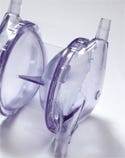Advanced PC Material Puts Blood Pump on Path to Clinical Success
A specialty compound helps prevent clot formations from adhering to pump walls
June 5, 2008
Originally Published MPMN June 2008
ENGINEERING SOLUTIONS
Advanced PC Material Puts Blood Pump on Path to Clinical Success
A specialty compound helps prevent clot formations from adhering to pump walls
|
Made from Lexan HPM resin, the Pulsar dialysis pump features a pressure-limited two-chamber design. |
Described as an alternative to traditional peristaltic technology, a hemodialysis pump applies positive and negative pressure to a flexible membrane within each pumping chamber to achieve blood flow. Renal Solutions Inc. (Warrendale, PA; www.renalsolutionsinc.com) initially fabricated the pump from a conventional polycarbonate (PC), which resulted in a sticky situation.
"After dialysis sessions, we would observe fibrin production and clot formations adhering to the pump walls," notes John Maholtz, senior vice president, operations and engineering. After consulting with Sabic Innovative Plastics (Pittsfield, MA; www.sabic-ip.com), Renal Solutions replaced the PC with a more advanced material. That, coupled with a modification in the design of the device, solved the problem.
After discussing the matter of clots adhering to the PC with specialists from Sabic, Renal Solutions decided to give Lexan HPM1944 a try. The material met the physical and mechanical requirements of the pump while offering enhanced blood-contact properties. Lexan HPM1944 is a biocompatible PC that provides up to 50% greater retention of platelets in the blood, up to 50% less leukocyte activation, and as much as 60% lower fibrinogen adsorption to the material's surface than conventional PC.
"By implementing the design and material changes, it appears that we have reduced the likelihood for thrombosis or clotting in the pump," Maholtz says. "In fact, based on initial treatments [lasting] up to 6 hours, the walls of the Pulsar pump have remained clean."
Unlike peristaltic pumps, which use compression to squeeze blood through a dialyzer, the Pulsar pump gently moves blood using a pressure-limited two-chamber design. Patients benefit, according to the firm, because pressure at the access site during circuit occlusions is minimized. The technology also facilitates conversion to a single-needle application, which is accomplished simply by selecting the appropriate mode on the graphical user interface. The transition can be a cumbersome and difficult process in peristaltic pump designs, according to Renal Solutions. The Pulsar pump is an integral part of the Allient Sorbent Hemodialysis System from Renal Solutions, which was acquired by Fresenius Medical Care AG & Co. in November 2007.
Sabic Innovative Plastics, formerly GE Plastics, is a global supplier of plastic resins used in a number of industries. It manufactures and compounds PC, ABS, ASA, PPE, PC/ABS, PBT, and PEI resins as well as high-performance specialty compounds with such brand names as Lexan, Cycolac, and Ultem.
Copyright ©2008 Medical Product Manufacturing News
You May Also Like


.png?width=300&auto=webp&quality=80&disable=upscale)
